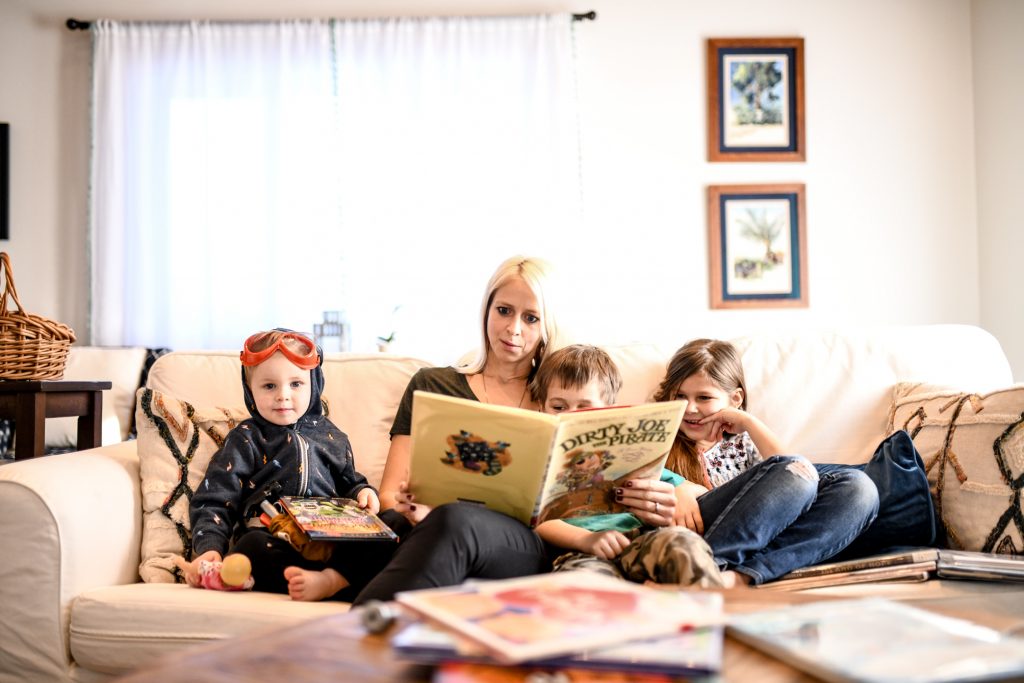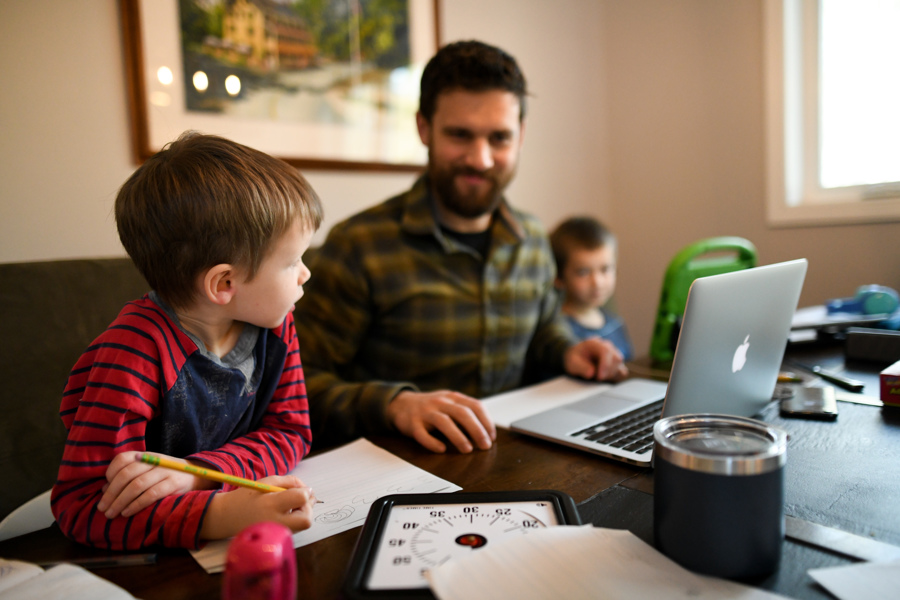I never imagined homeschooling my own children. In fact, I remember going from homeschool to attend high school at St. Thomas Aquinas thinking, “That was great, but I’d never want to do that with my own kids.” I went on to become a high school English teacher and brought many of my homeschool experiences with me to create an engaging and dynamic classroom.
Once my daughter was born, my husband and I thought the same thing my parents probably thought when they decided to homeschool me and my siblings in the ’80s: there’s got to be a better way.
Maybe you’ve thought the same thing? Maybe the idea of sending your kid into a crowded school, or locked-down classroom or having multiple children on different Zoom schedules doesn’t sound like fun. There’s no doubt that education has taken a radically different form over the past six months as schools, teachers, and parents have navigated the effects of the pandemic. While not everyone has the privilege of choosing to homeschool, it can be a great alternative if you’re feeling like there must be a better way.
Getting Started: Homeschooling in New Hampshire
If you’re thinking homeschooling might be an option for you and your family you’ll first want to familiarize yourself with New Hampshire’s laws regarding homeschooling. Thankfully, New Hampshire is a very homeschool-friendly state which makes complying with laws and requirements relatively simple and easy.
- Notification – You’re required by law to notify a ‘participating agency’ of your intent to homeschool. Participating agencies can include the superintendent of your local school district or the principal of a participating private school. You can find a list of participating non-public schools HERE. Your letter of intent should include the names, dates of birth, and address of the children between the ages of 6 and 18 whom you intend to homeschool. You can find a letter template HERE. You must submit your letter within five days of beginning homeschooling or when you move to a new school district or change participating agencies.
- Curriculum Requirements – Homeschooling in New Hampshire does not require a curriculum. But, by law, homeschoolers must teach science, math, language, government, history, health, reading, writing, spelling and the history and constitution of New Hampshire and the United States. Additionally, they must include exposure to and appreciation of the arts and music.
- Evaluation and Documentation – The state requires a portfolio with samples of the child’s work for evaluation. Each homeschooled student must be evaluated annually. However, parents can choose the method of evaluation — either by standardized testing or by review of the child’s portfolio by a certified teacher. The evaluating teacher then provides a letter of evaluation that the parent keeps with the portfolio for their records. You can find a list of homeschool evaluators HERE.
 Homeschooling Styles
Homeschooling Styles
When it comes to homeschooling, there are multiple methods and approaches. Our family opts for a flexible style that allows us the freedom to choose a curriculum that works for each child’s learning style. Plus, it incorporates our love of the outdoors. My experience of homeschool was with the School-at-Home model. We had desks, a whiteboard on the wall and a daily structure similar to a traditional school day.
Keep in mind that every support group you’ll find in the Seacoast and around New Hampshire often reflects a certain style. Understanding these styles and finding the one that fits your family best is key to finding your “tribe” and thriving as a homeschooling family. It’s also important to note that you can move fluidly through all the styles of home education until you find a structure and method that works for you.
- Classical – The classical or traditional approach to homeschooling focuses on grammar, logic and rhetoric and centers around classic texts and the Socratic method. This method is reading-centric and involves rote learning, which can be challenging for struggling readers.
- Unschooling – The unschooling method is a free-form model where learning is driven by the student’s interest and curiosity. Unschooling is unstructured and does not incorporate evaluation with quizzes and tests. Instead, it focuses on learning through self-guided discovery and exploration.
- School-at-Home – This homeschooling method is often the first that families try when they start homeschooling. The School-at-Home method often centers around a complete curriculum and follows a similar schedule and structure to a traditional school day.
- Eclectic Homeschooling – Eclectic homeschooling is a relaxed method that borrows from each of the other methods. This flexible method allows parents to pick and choose curriculum and resources based on their own and their child’s preferences and learning styles. Can this customized approach can be more work? Yes, but is often the place where most homeschoolers end up after trying multiple methods and curriculums.
You can find a more in-depth description of these methods and more HERE.
How to Choose a Curriculum when Homeschooling in New Hampshire
Choosing a curriculum is often the most daunting task once you decide to start homeschooling. How do you know what’s the right fit for you and your child? After requesting multiple catalogs and spending hours online, I made a decision. I ultimately decided that instead of purchasing a complete curriculum package (which can get incredibly expensive), I would piece together resources on all of the required subjects. For our daughter’s first year I found various workbooks that I liked and purchased them on Amazon (Handwriting without Tears, Explode the Code, Hooked on Phonics and Mathematical Reasoning). I looked at recommended reading lists and enrolled her in an experiential science class. I also found a read-aloud history book that interested all of us. We took a relaxed approach and Sophia passed her end of year evaluation with flying colors.
I tried the same approach with my son Jack and was met with resistance. He wasn’t the same kind of learner as Sophia and required a totally different technique. At first, I struggled with the fact that he was “behind” where his sister was at his age. Was if I was failing him? But just this past year, he grew leaps and bounds. He closed the gaps in the areas where he struggled. Allowing him to move at his own pace is critical for him in staying encouraged and motivated.
 This is one of the benefits of homeschooling. If your child is ‘behind’ you can cater to their learning styles and needs. You can go at their own pace and trust their internal timing.
This is one of the benefits of homeschooling. If your child is ‘behind’ you can cater to their learning styles and needs. You can go at their own pace and trust their internal timing.
Our third child, Liam is also a learner unto himself. He is just school-age this year so we’ve yet to see how he will respond.
Now that all of our children are school-aged, we’ve opted to use some online resources (Accellus Academy) along with texts and workbooks that we hand select to piece together a complete curriculum that works for each of our kids.
A complete curriculum (like this one) can be helpful if you’re feeling unsure of your ability to plan the school year and keep multiple children on track at grade level. However, it can be a very expensive way to start! Plus, if you make the investment and find out later that it’s just not working, it can be incredibly frustrating. While covering all the required topics, creating a portfolio and preparing your child for evaluation is important, the way in which you explore and learn those subjects is entirely up to you!
My suggestion is to start as inexpensively as possible. Begin with your end-goal in mind — like grade level bench-marks. Then plan your year in 3-4 weeks at a time, setting smaller goals for each unit. If this detailed planning intimidates you, adopt a more exploratory method. The most important thing is to take the pressure off yourself. Any kind of pressure or stress you create will trickle down to your children. In my experience, this is the source of most resistance, fighting, and struggle.
Homeschooling isn’t easy. But it’s incredibly rewarding to bear witness to and be inextricably linked to your child’s learning journey.
 Sarah is an entrepreneur, athlete, homeschooling mama and writer living in New Hampshire with her husband and three children. She grew up on the Seacoast and her experience of homeschool from K-8 inspired her to become a teacher. Sarah taught high school English in both public and private schools before transitioning to her role as full-time homeschooling-mompreneur. Sarah is the founder of the popular women’s running retreat, Rise.Run.Retreat. When she’s not mom-ing you can find Sarah running all over New Hampshire’s most prominent peaks or competing on snowshoes. You can find more from Sarah on her website, sarahcanney.com or Instagram @sarah.canney.
Sarah is an entrepreneur, athlete, homeschooling mama and writer living in New Hampshire with her husband and three children. She grew up on the Seacoast and her experience of homeschool from K-8 inspired her to become a teacher. Sarah taught high school English in both public and private schools before transitioning to her role as full-time homeschooling-mompreneur. Sarah is the founder of the popular women’s running retreat, Rise.Run.Retreat. When she’s not mom-ing you can find Sarah running all over New Hampshire’s most prominent peaks or competing on snowshoes. You can find more from Sarah on her website, sarahcanney.com or Instagram @sarah.canney.
*All photo credits @rayaonassignment










